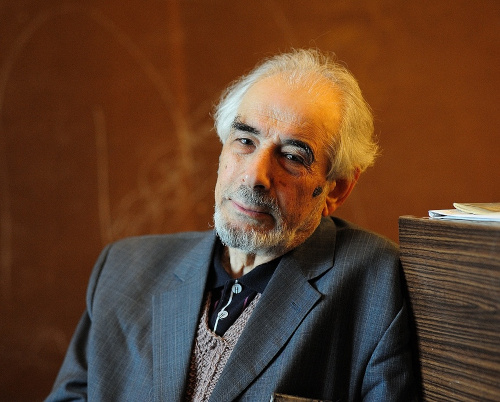Lev Mironovich Gindilis
(Contributed by Leonid Gurvits)
 Lev Gindilis (Credit: Sternberg Astronomical Institute)
Lev Gindilis (Credit: Sternberg Astronomical Institute)
Lev Gindilis was born in Kiev, USSR (since 1991 -- Kyiv, Ukraine) on September 3, 1932. In 1950, he began studying at the Department of Astronomy of Moscow State Lomonosov University (MSU). His classmates included Viktor Brumberg, Yuri Galperin, Nikolai Kardashev, Edward Kononovich, Vladimir Kurt, Vasily Moroz, Yuri Pariiskii, Natalya Soboleva, and Pyotr Shcheglov, who all later became renowned scientists in various fields of astrophysics, celestial mechanics, and radio astronomy. This was the first class in the world to receive a specialized course in radio astronomy, taught by Iosif Shklovsky.
After graduating from MSU in 1955, Lev Gindilis began working at the Sternberg Astronomical Institute (GAISh), where his entire professional career unfolded. Initially, he worked in optical spectrophotometry and defended his PhD dissertation on this topic in 1962 under the supervision of Nikolai Pariiskii (who had previously supervised Iosif Shklovsky's PhD dissertation). In 1957, in connection with the International Geophysical Year, he participated in organizing and conducting the High-Mountain Expedition of GAISH in the Zailiysky Alatau mountains. From 1958 to 1963, Lev Gindilis led the permanent High-Mountain Expedition of GAISh, which later became the Tien Shan Station of GAISH.
In the early 1960s, under the influence of Iosif Shklovsky, Lev Gindilis became involved in radio astronomy research at GAISh. Nikolai Kardashev, with whom Gindilis shared a close life-long friendship, also played a significant role in this. In 1962, the first edition of Shklovsky's book Universe, Life, Intelligence was published. While working on the book, Shklovsky discussed and refined many of its chapters with his students and close colleagues, including Kardashev and Gindilis.
In 1965, Lev Gindilis became a staff member of the Department of Radio Astronomy at GAISh, headed by Iosif Shklovsky. His work focused on the construction and maintenance of large radio telescopes (facilitated by his experience at remote optical stations of GAISh) and on the CETI/SETI (Communication with / Search for Extraterrestrial Intelligence) programs.
Starting in 1965, Lev Gindilis represented GAISh in the RATAN-600 project, led by Yuri Pariysky (Main Astronomical Observatory, Pulkovo). From 1967 to 1977, Gindilis served as the official representative of the Division of General Physics and Astronomy of the USSR Academy of Sciences for RATAN-600. From 1974 to 1975, he acted as Head of the GAISh laboratory at RATAN-600. From 1980, together with Nikolai Kardashev, Vyacheslav Slysh, and Vladimir Zabolotny, he worked on developing the project of a 70-meter diameter radio telescope on the Suffa Plateau in Uzbekistan. Construction of this telescope was not completed before the collapse of the USSR in 1991, and in subsequent years, the geopolitics and economies of both Russia and Uzbekistan prevented the project's completion.
In 1964, Lev Gindilis participated in organizing the first All-Union Conference on Extraterrestrial Civilizations at the Byurakan Astrophysical Observatory in Armenia. In the second half of the 1960s, he was involved in several projects searching for radio signals from extraterrestrial civilizations. He developed a method for searching for pulse signals with dispersion compensation of the interstellar medium. In 1968-1969, he lectured on the basics of interstellar communication for students of the Department of Astronomy at MSU. Lev Gindilis was one of the initiators and active participants in the most significant international discussion on the SETI problem - the American-Soviet SETI Conference held in Byurakan (Armenia) in 1971.
Later, he organized and conducted numerous All-Union, All-Russia, and international seminars and conferences on extraterrestrial civilizations. Over time, Lev Gindilis became one of the most authoritative experts in this field. He created and maintained an archive of SETI documents. He also paid considerable attention to the history, methodology, and philosophy of science, as well as its popularization. Lev Gindilis was known for his remarkable ability to explain scientific issues to children of all ages and students of various specialties. He authored over 300 scientific and popular science papers and seven books, and co-authored five collective monographs. He served on the Permanent Committee on SETI of the International Academy of Astronautics and participated for many years in Commission 51 on Bioastronomy of the International Astronomical Union. But above all, Lev Gindilis was known to many collegues, students or even chance acquaintances as a highly erudite and benevolent man.
Lev Gindilis passed away in Moscow on May 27, 2021.
![[IAU logo]](iau_wb_thumb.jpg)
![[URSI logo]](URSI-logo-thumb.jpg)
![[Karl Jansky at his antenna]](jansky_photo_02_thumb.jpg)
![[Reber's Wheaton antenna]](Reber_Telescope_Wheaton_thumb.jpg)
![[Dover Heights]](Dover_Heights_02_thumb.jpg)
![[4C telescope]](GB61-195_4C_telescope_thumb.jpg)
![[Ewen and horn antenna]](ewen_horn1s.jpg)
![[Dwingeloo, 1956]](Dwingeloo-1956-thumb.jpg)
![[Jocelyn Bell Burnell and Cambridge antenna used in pulsar discovery]](burnell2_thumb.jpg)
![[Lovell Telescope at Jodrell Bank]](site_1594_0001-500-334-20180316163019-thumb150.jpg)
![[Wilson, Penzias, and Bell Labs horn antenna]](wilson-penzias-horn_thumb.jpg)
![[6-m Millimeter Radio Telescope in Mitaka, Japan]](6m-thumb.jpg)

